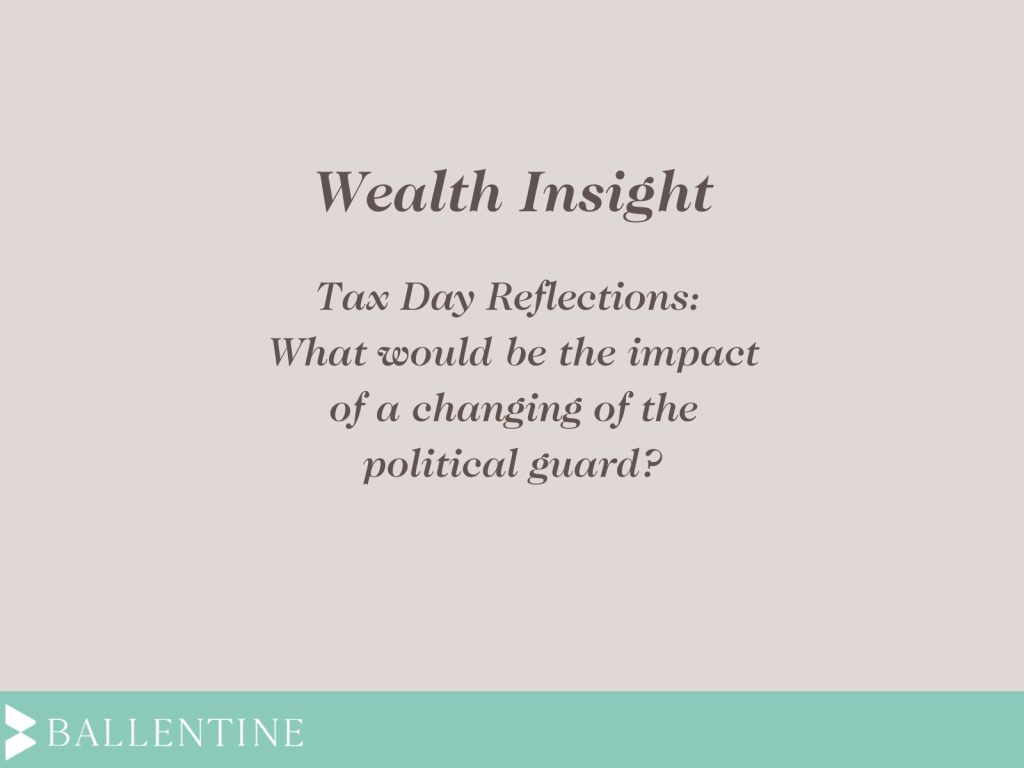By Bruce D. Simon, CFA, CPWA® and Adam Ochlis, CPA, MST
With polls currently trending toward a Democratic presidential victory and possible retaking of both houses of Congress, the implications for taxes and financial markets could be significant. On the tax front, the Presidential election looms large due to the considerable policy differences between the parties. The ramifications of a shift in governmental control on equity markets may be somewhat more nuanced, but no less important. Although a lot can change before November, we believe it is timely to consider the impact of a change in political leadership in Washington and how it might affect both planning and investment strategy.
A Review of Democratic Tax Proposals
As a reminder, we are only 30 months removed from the enactment of the Tax Cuts and Jobs Act (TCJA) that impacted individual taxpayers and businesses alike. The TCJA lowered the individual income tax rates for ordinary income, expanded the standard deduction for millions of taxpayers, and curtailed certain itemized deductions for others. The legislation also reduced the number of taxpayers impacted by the Alternative Minimum Tax and increased exemption amounts applicable to the gift and estate tax. On the business side, the legislation lowered the corporate tax rate from a high of 35% to 21% while making companies structured as passthrough entities (S corporations, limited liability companies, and partnerships) more competitive through a new Qualified Business Income deduction.
Unsurprisingly, candidate Biden has proposed to roll back many of the tax changes implemented through the TCJA. In a Biden administration, the highest individual marginal rate could return to the pre-2017 level of 39.6% and the corporate rate could jump to 28%. Some economists, including Gary Cohn, former director of the National Economic Council under President Trump, have stated that a 28% rate would still be low enough for U.S. businesses to remain competitive worldwide.
One of Biden’s individual tax proposals is to tax long-term capital gains (i.e. assets held longer than a year) at the same rate as all ordinary income and short-term capital gains for taxpayers earning more than $1 million annually. In other words, the proposal would tax ordinary income and long-term capital gains for those high-earning taxpayers at the same 39.6% rate. This would return us to the period of 1988-1990, the only time in history when long term capital gains were taxed at the same rate as ordinary income.
Another proposal that generated considerable discussion during the Democratic primary season was that of a wealth tax, or taxing an individual’s wealth each year in addition to the tax on annual income. Commentators have spent much time pontificating about the constitutionality of a wealth tax and the myriad issues related to its enforcement. But the issue remains a high priority for some members of the party, particularly the progressive wing. To date, Biden has not endorsed the concept and we view the likelihood of passage of a wealth tax as very low.
Planning Implications
Of the current proposals being floated by the Biden campaign, the two that are drawing the most attention are the aforementioned near doubling of the long-term capital gains rate and the possible changes to gift and estate tax regulations.
Long-term capital gains. Consider a situation where a client has held on to an underperforming stock with a low basis for a long time in order to avoid paying a tax of 20% on its appreciation. If the rate jumps to 39.6%, the argument for realizing the gain sooner becomes much more compelling. The collapse of stock prices in March created the opportunity to realize significant tax losses which could be used to offset the gains realized from selling the underperformer at little or no out-of-pocket tax cost. So, it could be good time to pull the trigger on the sale. At the same time, the tax losses realized earlier this year may be more valuable in a future of higher capital gains rates, so it might be better to hang on to these losses.
Ultimately, investment fundamentals will likely dictate the best path forward.
The tried and true strategy of gifting highly appreciated securities (and entirely avoid the capital gains hit) to fund philanthropic objectives should become more valuable in a higher tax regime, although Biden’s proposal to limit the benefit of certain itemized deductions – something President Obama proposed but failed to enact – could dampen its value.
Gift and estate tax changes. Since the passage of the TCJA, utilizing the larger gift and estate exemption (now $11.58 million per person) by transferring wealth to younger generations has been an effective strategy. These provisions in the TCJA revert to the 2017 levels of $5 million per person (adjusted for inflation) in 2026. The caveat in the discussion has always been that the law is fluid and Congress and the President can change it at any time.
With the election now 16 weeks away and the possibility that Biden could look to accelerate the sunset provisions (or go even further by lowering the exemption to, say, $3.5 million per person), wealthy families with estate transfer objectives should apply a heightened sense of urgency to take advantage of the current law. If Biden wins, one could envision that certain tax changes could be made retroactive as early as January 1, 2021. There is still ample time to consider strategies to utilize exemption amounts before year-end, but those discussions should begin now.
Biden is also proposing to eliminate the step-up in basis at death which enables assets in a decedent’s estate to be sold with little or no tax cost. This provision, also a holdover from the Obama administration proposals, speaks to the importance of trying to locate assets in the most tax efficient manner possible using the rules in place at the time. For example, having the most highly appreciated assets located in the estate of the older generations may not make sense post-2020 if the step-up in basis at death is eliminated.
Investment Implications
Conventional wisdom holds that divided government is best for financial markets, since the ensuing gridlock enables the perpetuation of the status quo. The argument is that markets hate uncertainty, and divided government reduces the chances of any radical legislation passing that would be unfriendly to investors. If the Democrats regain control of the Senate, maintain leadership in the House, and win the White House, is the stock market headed for a fall?
In fact, the data shows the opposite. The US stock market performed better during periods when one party controlled both the White House and the Congress than when the government was divided, irrespective of which party was in control. According to Nicholas Colas of DataTrek Research, the S&P 500 posted an annual average gain of 16% during Republican control and 14.3% during Democratic control between 1945 and 2019. During periods when control was shared, the S&P 500 on average gained 10.8% annually. In and of itself, full Democratic control should not be especially concerning to investors.
If Biden is successful in hiking the corporate tax rate from 21% to 28% as noted above, S&P earnings are expected to decline by as much as 20%, according to Goldman Sachs. The S&P 500 rallied more than 28% from the date of Trump’s election to the passage of the TCJA. All else equal, a partial reversal of the corporate tax rate cut should result in a proportionate decline in stock prices
Beyond the corporate tax hike, other Democratic policy changes could have a meaningful impact on specific companies and industries. A Democratic administration might be tougher on antitrust legislation, reducing industry consolidation. The enormous reach of today’s dominant competitors (e.g. Apple, Amazon, Facebook, and Google) could be under increasing pressure to divest or restructure. A new administration could reimpose new regulatory burdens on corporations, rolling back some of the changes made during the Trump administration and crimping profit margins. They might pursue a nationwide hike to the minimum wage, raising the cost of labor to businesses. At the industry level, they could take a tougher stand on regulating the fossil fuel industry and/or imposing changes to the healthcare system that would lower the profitability of healthcare providers. These changes would likely all be perceived as market-unfriendly.
At the same time, a democratic administration, with help from a supportive Congress, may be more willing to spend aggressively to restore the economy to its pre-COVID growth trajectory. This might include additional forms of financial support directly to individuals, and/or the passage of a large package that could provide additional jobs while rebuilding the nation’s crumbling infrastructure. An administration more attuned to the climate change crisis may enact incentives designed to promote growth and development in alternative energy sources. Under a Biden Presidency, the US is more likely to sign new trade treaties, and less likely to engage in trade wars. Immigration policies will likely relax, which is a favorable development for many industries, particularly tech, that have historically relied on international talent.
While no one likes to pay more in taxes, higher marginal tax rates on individuals should increase the relative attractiveness of tax-exempt municipal bonds versus their taxable counterparts.
Bottom Line
Should he win the presidency, Biden will probably be sensitive to the political and economic climate before attempting to implement tax increases. An immediate tax hike foisted upon an electorate still recovering from the devastating effects of the coronavirus pandemic and facing high unemployment levels may be politically unwise, regardless of which party controls Congress.
Financial markets seem to agree. Even as prediction markets have reflected a growing probability of a Democratic sweep in November, stock prices have remained firm. At present, investors appear unconcerned about the prospects of a significant change in political leadership, preferring to focus on the path to a full economic recovery.
For planning purposes, though, we are contemplating a scenario in which some or all of these proposals would be enacted if the Democrats were to take the Presidency and control of the Senate, while retaining the House. However, Democratic control of the Senate, if it happened, would likely be by a narrow margin. As noted above, we consider it unlikely that a wealth tax could make it through the legislative gauntlet in that environment. For the same reason, capital gains tax increases on the order of Biden’s proposal strike us as unlikely. Higher marginal rates, a re-write of the TCJA, and changes in the estate and gift tax rates and exemptions are our primary planning scenario.
It should go without saying that making investment and planning decisions solely in anticipation of a Biden presidency is unwise. In some ways, the election seems to be right around the corner. In others, it’s the same amount of time since we first added the terms “social distancing” and “coronavirus” to our lexicon. A lot can, and likely will, change between now and November 3rd.
About Bruce D. Simon, CFA, CPWA®
Bruce is a Partner and the Director of Research at the firm. In addition to working directly with a number of family clients, Bruce serves on Ballentine’s Investment Management Committee, which is responsible for the oversight of all of the investment activities for the firm.
About Adam Ochlis, CPA, MST
Adam is a Partner, Senior Client Advisor, and Planning Group Chair at the firm. While responsible for multiple areas of wealth management, he has a particular expertise in income tax planning for high net worth individuals. He keeps abreast of tax developments and informs the firm of changes in legislation and implications for the firm’s clients.
This report is the confidential work product of Ballentine Partners. Unauthorized distribution of this material is strictly prohibited. The information in this report is deemed to be reliable but has not been independently verified. Some of the conclusions in this report are intended to be generalizations. The specific circumstances of an individual’s situation may require advice that is different from that reflected in this report. Furthermore, the advice reflected in this report is based on our opinion, and our opinion may change as new information becomes available. Nothing in this presentation should be construed as an offer to sell or a solicitation of an offer to buy any securities. You should read the prospectus or offering memo before making any investment. You are solely responsible for any decision to invest in a private offering. The investment recommendations contained in this document may not prove to be profitable, and the actual performance of any investment may not be as favorable as the expectations that are expressed in this document. There is no guarantee that the past performance of any investment will continue in the future.




